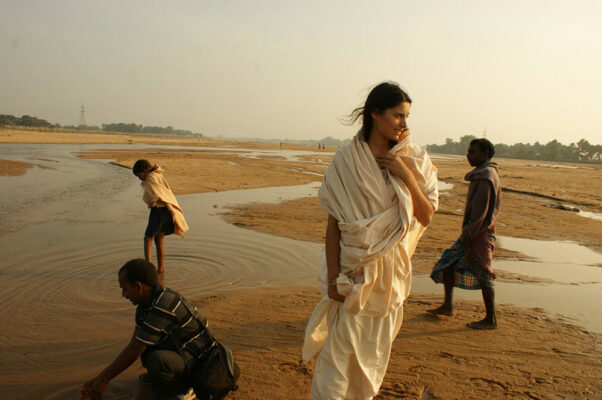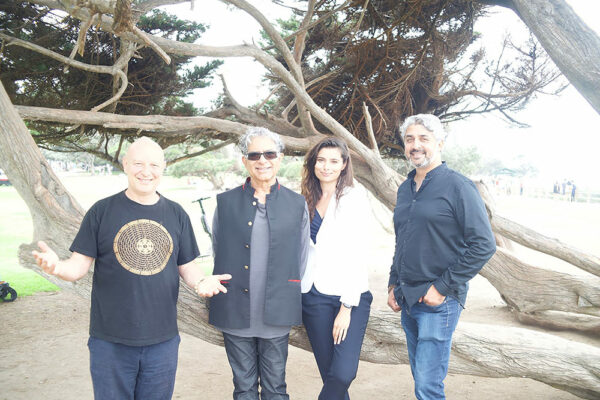S4 E1: Gabriella Wright on Mental Hygiene and Awareness
Released September 21, 2021
Trauma can affect us in many ways, but what does it look like to turn that adversity into activism? Today we speak with actress and activist Gabriella Wright as she discusses how her past and the loss of her sister inspired her to lend her voice to help others. She also shares how she thinks how Hollywood portrays mental health and how the next generation is advocating and effecting change.
Podcast Transcript
Gabriella Wright: Mental hygiene is another term that I’ve been using for tools of practical self-awareness, like how to be self-aware of our thoughts, how to know that we are not our thoughts. When you’re distressed, what can we use to just evacuate the sensation of panic or anxiety, and how can we build on many, many mental hygiene tools of self-awareness that then can help you maybe get helped by a mental health practitioner?
Dominic Lawson: Welcome to Beyond Theory, a podcast powered by Meadows Behavioral Healthcare that brings you in-depth conversations with firsthand insights from the frontlines of mental health and addiction recovery. I’m Dominic Lawson.
Trauma can affect us in many ways, but what does it look like to turn the adversity into activism? Today, we speak with actress and activist Gabriella Wright as she discusses how her past and the loss of her sister inspired her to lend her voice to help others. Let’s get out of the abstract and see how this applies in the real world. It’s time to go Beyond Theory.
Gabriella Wright: Hi. I am Gabriella Wright. I am an actor, actress. I am an activist. I’m a mother. I’m the cofounder of the Never Alone Initiative of The Chopra Foundation and I’m a human explorer. I explore life. I explore consciousness, and I try to explore the roots of suffering so we can liberate from it. So, if that makes any sense whatsoever, that’s who I am right now.
Dominic Lawson: Thank you so much for coming on the Beyond Theory podcast. It’s such an honor to have you on the show. If you would, Gabriella, just share with us your background if you would.
Gabriella Wright: Background is long story. I am English. My dad is English, British-Scottish. My mother is French-Portuguese-Mauritian. So, I’ve been brought up in a very multicultural world in that sense. My father still doesn’t speak French. So, that says it for the British in him, but my mother is multilingual.
I was brought up between London and France probably until my 20s. That’s how I learned a lot of my multicultural, trying to understand the different etiquettes that we have and the different challenges that you can have by having different perspectives in life.
So, I was studying acting in New York. I started also acting in New Zealand, and I just went from there into coming back to France, making French films, having a child with my ex-husband who’s French-Russian. I’m divorced 10 years ago, and now I live with my son in Los Angeles for the work that I do as an actor, as an activist. That’s a broad background, but basically, I’m an international explorer.
Dominic Lawson: If you will, Gabriella, just share with us your background in working in the mental health space.
Gabriella Wright: That starts with a lot of human exploration first. That’s why for me it’s super important why I was saying I was multinational and multicultural because it actually stems from the question, “Who am I?” I started really in the mental space. We all are connected to this mental space. It’s understanding the true nature of who we are, like why do we suffer? When I think of something that displeases me, I feel it’s so present that I cannot do anything today?

These questions started when, unfortunately, I was raped and abducted when I was almost 18 years old. Because I never asked those questions before, and I never realized what trauma was until something traumatic happened to me, and I experienced the essence of living with trauma on a daily basis. And all I wanted was to liberate from it.
All I wanted was to just be free of this suffering. Because I realized through distinction that my body was okay after, but my mind was not. That mental space was so vast that I just didn’t know how to tackle it, and I wanted to be the person I was before.
The need, the necessity, and the urge for me wanting to experience the joyful teenage self, that’s what I wanted, and my goal was to experience that again. So, I tried everything, and that’s what got me on the journey in the mental space, leading into meditation to the study of Vajrayāna, for example, which has been with me till today.
It’s been 20 years now, and that has never left me. As you know, the Buddhism principle is, “How do you free yourself from suffering, an ultimate, existential suffering and trauma along the way that peaks in the mountain of the mental landscape that you have as a human self?”
That’s how it started, but it got more precisely into mental health and suicide prevention when I lost my little sister to suicide, and that is still very fresh. It’s still the living tragedy, and I suppose all who are listening here, it’s a tragedy for everyone. It’s a tragedy for humanity when you lose people to suicide. It’s so sudden.
We’re so blind to it that it really creates a shift in your reality. What it did to me was I realized my blind spot. Even though I was on this human exploration, even though I was an activist, even though I was building all of these blocks for other people to stand on and for me to experience more joy, I was unable to perceive an invisible realm.
The realm of mental health and mental distress in the mental space is a niche that has a lot of mysteries bound to it. The mystery of my sister’s loss, she was a songwriter and incredible artist. Her lyrics were full of mental distress, but we are perceiving it as beauty.
We’re perceiving it as something so incredibly vast and rich. I didn’t see it nor did my parents see it as an effective mental distress. We thought that it was more of a cathartic realization of why writing lyrics and making these songs about the inner journey, because we all experienced the inner journey as I started.
I was like, “This has to stop,” and I was able to meet Dr. Deepak Chopra. He loved what I was coming with, which was just evolve with vulnerability. As an actor, I had a project that’s finally finishing. It’s called We Are Never Alone. It’s a film about a mother who loses her son to suicide. So, I interpret the mother within all of the healing journey that I experienced as the sister to my sister and as a bigger sister, the eldest sister to my little sister.
It’s still very emotional, of course, but we were able to create this movement called Never Alone. Now, we’re on a quest to democratize resources, to destigmatize, to help people who are on the other side of the globe in their mind, wherever you are, and it’s really to tap into that hidden space that we all have.
Sorry, that was a very long background, but I think I needed to set the tone of why we’re here and why I’m here, and it’s a privilege to be speaking with you because of the platform that you’ve created for mental health, and you’re in the mental space and a little bit different angles. I’m sorry to be rambling. That’s not the point, but I just wanted you to hear because it’s not normal for an actor to be so engaged like this.
Dominic Lawson: It’s fine. That’s actually why we wanted to have you on the Beyond Theory podcast. You told this moving story about your sister, Paulette. I think you refer to her as PeeWee, if I remember correctly. But one of the things you said about Paulette was really moving to me and I wanted to ask you to elaborate on it. You said that her lyrics [were] an art form, but it was also like a mental assessment. Could you elaborate on that a little bit, if you don’t mind?
Gabriella Wright: See, I’m very moved now because, as you know, it’s still very fresh. When you look at her art, which is actually her legacy now, that’s what she left behind, it’s like a jigsaw puzzle. It’s very interesting. She left many journals behind, and I refused to look at them.
My mother looked at them. My mother and sister did. I don’t think my father did either, but I didn’t because, for me, a journal is a very intimate space. Whether you’re here or not, that’s your intimate self, but what she shared with the world is her lyrics and that I can dive into, because that’s what she was willing to share with the world.
It was a lot, like I said. When art is so beautiful, you’re mesmerized by the sound, the music, the resonance, the intonation of the chant. Then, all of a sudden, the lyric just fits in as if it’s painting this beautiful landscape and soundscape that you’re in. When after she died, I was like, “Let me dive into this a bit more.”
It was like a scripture. Everything was talking about how she was not fitting in the world, how she felt so much gap, why do people suffer. That’s what she was talking about. Her question, “Why?” I don’t think she found the answer, and I thought that the answer was the song.
It’s hard, that’s what I’m saying. It’s very hard to find and dive into the mental space that we all have because it’s hidden. My catharsis as an actress wasn’t the same as her catharsis. I need to play roles that get me through my trauma, to release it, and I know I’m feeling the release of it, but it didn’t work like for my sister, and I don’t think there’s one method for any artists or any human being.
Dominic Lawson: I appreciate you being candid and being transparent in sharing that, and that led you on the path of the work that you do now and work with Deepak Chopra. Talk about that collaboration, if you don’t mind, Gabriella.

Gabriella Wright: It’s a wonderful collaboration. When we talk about synchronicity, this definitely was synchronicity. It was two people meeting, his love for consciousness, as you know. He’s a mind-body pioneer.
He’s written 92 books. Who does that? He does. He dove into that world of consciousness and truly understanding. Consciousness is the equivalent of the mental space I mentioned before as I introduced myself.
As a student, I tried Vajrayāna Buddhism and also Vedanta. It’s truly understanding what is reality and that question, “What is reality? What is fundamental reality?” is the question that drives Deepak every day.
I haven’t read all of his books, but we exchanged a lot about it, and in every book there’s an essence of, “What is reality, therefore who am I? So, the “who am I” is linked to the human condition. We met, I actually met him in an interview. I was asked to interview him on consciousness, telepathy in autism. I don’t know why I was asked to.
They were like, “You understand consciousness,” but it is like, “I do, but does it matter?” I was already eight months in grief, and I didn’t really want to talk about consciousness at that time, and for some reason, the director asked me. He was like, “Please just do this,” and so I flew to New York, met him.
After the interview, I said, “It was lovely speaking to you, but do you realize that every 40 seconds someone dies by suicide?” It was interesting because his reaction, as I was reading his face, he was very stunned in that sense. I think those numbers are very high and that was pre-COVID, obviously, and numbers also shift reality. Data as well. And we have to measure this as a big deal, and he was very moved by that.
They shared my story about my sister and how I want to go on a mission to destigmatize mental outreach, mental health, so people can reach who they need to for help. That’s how it started. That was the seed. He came into the film that I was producing called We Are Never Alone, that’s hopefully coming out, and then we decided to create a movement.
The movement is basically, we want to democratize access — and I use the word “democratize” because it’s so important to access mental health resources but also create a platform where it’s free, whatever we need for our mental hygiene, as such, meaning the mental self-awareness, practical tools, that they be free — and then create systems that allow people to get paid resources as well in the mental health space and support the mental health professionals with the support on our platform.
There’s a lot of translation to do because we’re looking at it as a global movement. It’s not just western. It’s not just for the American language. It’s the English approach. It’s the French approach. It’s like, “What do we do in India? What are we looking at in Nepal?”
So, it is a large quest, but I definitely think it will be my life’s work. I do feel that. I’m very happy to have, to be alongside Deepak. Along the way, he has many endeavors, and we just came out of the Global Mental Health Summit, which was the second year coming.
This year, we had a spotlight on India, and we were able to look at the different angles of mental health in India because it’s very different — different resources, different conversations, different words, different language, different sensibilities.
That’s really how, the how and the why, and there’s so much that we’re building. Deepak is obsessed with technology, and his partner tries the technology as well. He is looking at different tools. He also goes to democratization of resources using technology, and I think we can’t escape technology. We need to use it to our advantage even if sometimes technology makes us feel isolated and disconnected. But there is a way to use it with consciousness and allow us, with presence, to find the gaps that are missing on the quest of creating a more healthier, mindful world in that sense.
Dominic Lawson: Gabriella, you talk often about mental hygiene. Shifting the focus to mental hygiene, can you elaborate on that, if you don’t mind, because I thought that was it?
Gabriella Wright: When I came up with it, I realized that it was used before in the 1920s by psychoanalysts and I thought it was fascinating. I came up with the word. It came to me, obviously thinking everything is inspired from my sister.
But I was thinking, we brush our teeth every day. We know that we need to have physical hygiene to just feel good in the world, so that we have a healthy body to interact with the world. It’s important. We teach kids in school that you have to brush your teeth. It’s very important. We teach in school that we shouldn’t really use swear words.
It’s important to have this education, and I realized that mental hygiene might be the missing gap between mental health, mental hygiene, and self-awareness. I think mental hygiene is another term that I’ve been using for tools of practical self-awareness.
How to be self-aware of our thoughts, how to know that we are not our thoughts. When you’re distressed, what can we use to just evacuate the sensation of panic or anxiety and how can we build on many, many mental hygiene tools of self-awareness that then can help you maybe get helped by a mental health practitioner professional?
But at least you have your little toolkit that allows you to have that independence and self-assessment that can then lead you to the right person when you need to. It’s in between. It’s not impeding on the mental health professionals. It’s actually more supportive of, and it’s more of something that you can tune into. How do I feel today? How does my mind feel today?
Once they’re on staff, I feel like, “What can I do then? What can I do to just improve maybe my mood?” Why do I feel that I’m a five out of 10 today?” And then start writing that, start breathing, and then start mindful exercises. So, that’s where mental hygiene is.
Dominic Lawson: You lend your voice to the UN on many different issues. Talk about that a little bit. I’m fascinated to know a little bit about that.
Gabriella Wright: Because of my story that I shared in the beginning, where I’ve gotten raped and kidnapped. Thank God I’ve overcome that trauma, but trauma has many different layers. There might be another layer that I haven’t seen yet, but I’d say the symptomatic symptoms of PTSD and all of that, I’ve overcome. I’m very proud to have overcome it.
Obviously the first, what do you do when you overcome something? You want to help others to overcome their trauma. You want to lend your voice. You just want to be there. You want to empower, and that’s something that I was very happy to lend my voice as a storyteller to the UN Trust Fund to End Violence against Women and Girls and UN Women. We were doing a lot of live events, actually in November, just before COVID hit Serbia.
We’ve been doing a lot of wonderful events just to raise awareness about what different women go through. So, I would interpret in first voice their stories on the UN stage on different occasions and it’s amazing to hear but also it’s an honor to be able to say these stories. It moves me a lot.
That led to so many other things on the honorary president of charity in Burma, and basically we support also women and girls who have been subject to violence and were able to pay for their summer schools. We extract them from their family, especially women who have experienced disabilities.
Also in the mental space, a lot of girls who cannot hear or speak but can sign. Unfortunately, there’s a high number of girls with disabilities who experienced domestic abuse and home abuse from family members.
So, it led me to many projects, many initiatives. Another one in Nepal, where they look at ending violence against women who are menstruating. There’s a lot of stigma to menstruation. What they do is in certain rural areas, they isolate women. It’s called chhaupadi. It’s a practice where they put them in a hut and they are not allowed to have water or food for five days whilst they’re experiencing the menstruation.
That has been my ongoing work ever since in my 20s. I’m now 38, so it’s been a long-term activist commitment, and I enjoy it, and I still feel that it’s only just the beginning.
Dominic Lawson: I want to ask you to shift gears here just a little bit. First of all, congrats on the film that’s probably ready to come out. I just wanted to say that. In TV and film, we see many different types of media portray mental health, addiction, and recovery in many different ways. I just want to get some commentary on how you feel about how TV, film, Hollywood — all of the above — portrays mental health.
Gabriella Wright: It’s a very good question, and it’s an essential question. I wish people would ask this question more often. I think it’s been done very poorly overall, but there are some gems. Frances is an incredible rendition of a true story. Jessica Lange won the Oscar for that interpretation in 1982. That’s a very rare case.
I think there’s a lot of mental illness in film. TV hasn’t been looked into. Someone with mental illness is going to act like that. Someone who is bipolar is going to switch personalities. Someone who’s schizophrenic is going to have multiple personalities.
It’s not that kind of painting on the wall. It’s more subtle than that, and what has been portrayed up until now has more been: “That’s what it is, and that’s the consequence.” But they haven’t spoken about the inner suffering of the person who’s experiencing that.
It’s more of the fear of the person, of that character. It’s the fear in the other people, but it’s not the mental distress in someone who’s experiencing such extreme, and normal, by the way. It happens every day in normal day society that there’s many of these mental illnesses, and I would say it’s normal in that sense.
So, normalcy hasn’t been portrayed in Hollywood, but I do have hope. I know that a lot of programs, HBO had a program for mental health assessment in films, I know that they’re doing that. I actually have to congratulate them, and I have to congratulate Kate Winslet for her incredible role of Mare of Easttown. Not only was she portraying emotional turmoil as a mother who loses her son to suicide, but she was also playing as a normal mother detective in an environment that addresses a lot of mental distress, that causes violence against women, against themselves.
I found it fascinating. She portrayed all the subtleties of what it is to be not only a victim of one’s own mental distress, but of a collective mental distress and the taboo. That TV show speaks about the taboo of suicide in an environment. I thought that was very encouraging. So, there’s hope, and I think it’s changing. People are more and more aware of it. It’s not a black picture.
I think it’s a moving picture that there’s a lot of hope. I feel that creators now are more socially responsible in so many different ways, whether it’s addressing Black Lives Matter, whether it’s addressing the LGBTQ+, we’re becoming a lot more mindful in our storytelling. So hopefully, it will merge into the mental health space.
Dominic Lawson: Can you speak about that hope? We’re starting to see is also a lot of Gen Z really talks about mental health a lot more and you’ve champion that generation as well speaking with them on many occasions. What is it about that generation that just gets it?
Gabriella Wright: I think they’re just so over us adults. They’re just like, “You guys don’t get it. You’re slow. You’re stuck up in your principles. We have a voice, and we want to be heard. We do not want to get involved in your stories of why you cannot express your voice. We don’t want you. You’re just stuck.” I feel that technology has helped them a lot.
All of these TikToks, all of these Triller apps, and all of these short format media has given them a platform to express themselves. I’m hopeful because they’re going to the streets. They’re real activists in that way. I was alone being an activist in my 20s. I was very alone, and the only example of an activist I had was John Lennon.
It’s not the same, and so I’m very impressed. I’m hopeful because I just say things as they are. I also have a 17-year-old, by the way. He’s turning 17 on Tuesday. He’s also very much engaged in in the world and how he thinks.
I think if we’re able to cradle — and when I say cradle, it’s more of nurturing — if we’re able to nurture their self-realization, their self-assessment, give them the tools that they need, that they learn the right things, that we give them the jewels, not the trash from our generation, then I really feel the world is experiencing not only a better place mentally but also physically.
Dominic Lawson: As we wrap up here on the Beyond Theory podcast, Gabriella, I just want to say thank you so much for coming on the show. Any last resources or books you’d like to suggest to our audience?
Gabriella Wright: Obviously, I’m going to share Never Alone. So please, go to neveralone.love. Of course, that’s our platform. You can actually start downloading the first version of our app, which is the neveralone.love app in the App Store. It’s the first version. We’re uploading content every day.
John W. Brick actually, who co-hosted our summit, will also have a channel on there. Basically, the principle is that everyone has a channel and can submit powerful content only in the mental health space so you can go and find what you need from many different angles: women’s mental health, storytelling, stories, movement, meditation practices that are specifically for the mind.
That’s where I’d like for you to go. I’m writing a book right now. I don’t know if it’s good or not. We’ll see about that next year. You can ask me the same question next year. Books, I haven’t read anything recently that I love, but films, I think you should definitely all watch Mare of Easttown on HBO. I think it’s a great rendition of a character navigating emotional turmoil in distress. I think those are the stories that we need to feel everything. We need to feel 360º of our emotions and the emotions of the environment so that we can avoid it further.
Dominic Lawson: Gabriella Wright is an actress, activist, and cofounder of Never Alone, a suicide prevention and mental wellbeing initiative of the Chopra Foundation. You can find more information about the Never Alone Initiative at neveralone.love. Beyond Theory is produced and hosted by me, Dominic Lawson.
You can discover more including videos of some of our conversations at beyondtheory.com. For more information on Meadows Behavioral Healthcare, go to meadowsbh.com. Finally, thank you for listening, and I hope you join us next time for another episode of Beyond Theory.






